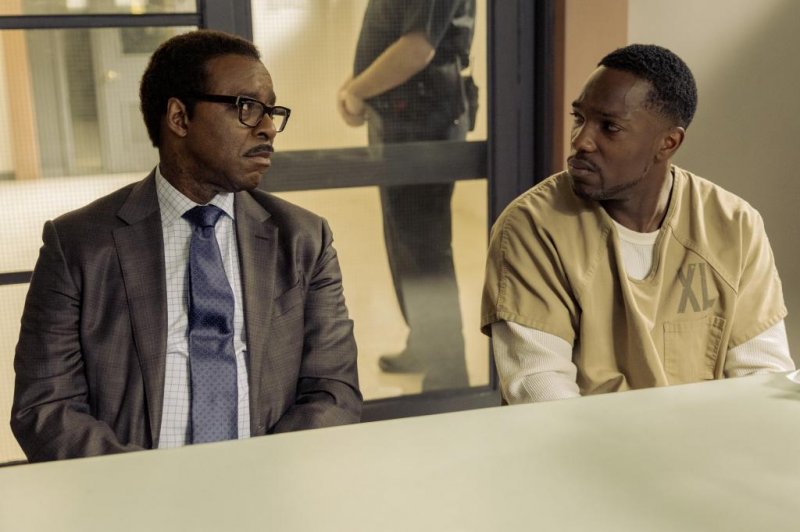Franklin Roberts (Courtney B. Vance, left) represents Moses Johnson (Tosin Cole). Photo courtesy of AMC 
LOS ANGELES, April 10 (UPI) — Courtney B. Vance said he joined the cast of 61st Street, premiering Sunday on AMC, to help forward discussions about policing in Black communities. Vance plays Franklin Roberts, a Chicago attorney.
“We need to bring people together to talk,” Vance said on a recent Television Critics Association Zoom panel. “This really is the only way that we’ve found to be able to talk – with these shows.”
61st Street introduces Franklin, who represents a Black father who stole baby formula for his infant. The White judge issues a harsh sentence despite Franklin’s call for empathy for the struggling family.
Franklin later takes the case of Moses Johnson (Tosin Cole), who was walking home from school when police busted a street-corner gang, assuming Moses was with them. Moses fled, but accidentally killed an officer.
Lt. Brannigan (Holt McCallany) is determined to paint Moses as a heroin dealer, and even plants drugs in Moses’s mother’s house. Vance said he hopes 61st Street provides a vehicle for communities to discuss real-life policing issues.
“There’s no forum for people to sit down and talk about it,” Vance said.
On 61st Street, Brannigan paints every Black person in the South Side of Chicago as a drug dealer or gang member. Vance said he believes police violence to be a bigger issue in major cities than in small communities.
Vance said he often visits small towns when he drives across the country and sees a different relationship between police and citizens.
“When you know people, you don’t lead with your gun,” Vance said. “You lead with, ‘Jimmy, oh, what did he do? OK, let me go talk to him.'”
Franklin fights for justice in this community despite coping with panic attacks after tense arguments. He knows the tactics the police will use against Moses, but encourages Moses to work with him to avoid being shot and killed.
Vance said no easy answers exist to curb police violence, adding that something must change so police killing suspects occurs less frequently.
“The same issues are happening in police departments all over the country,” Vance said. “They shoot first and then they talk.”
In 61st Street, cops like Brannigan know they are protected if they target a Black teenager like Moses. Vance said when then 17-year-old Darnella Frazier filmed the death of George Floyd, it demonstrated officers who did not worry about consequences.
Officer Derek Chauvin was convicted of the second degree murder of Floyd for kneeling on his neck for over 8 minutes.
“The camera didn’t make any difference,” Vance said. “There’s an issue with how people see people and how Black people are viewed.”
Vance offered suggestions for revising police tactics. For example, he said, non-lethal force remains an option.
“He’s got a knife, you got a gun,” Vance said. “Shoot him in the leg. Get him on the ground. Make sure he lives.”
Vance said police often justify violence as self-defense, saying they feared for their lives. Vance said the public and legal system should stop accepting that justification.
“You can’t fear for your life and shoot people and then hide behind ‘I feared for my life’ all the time,” Vance said. “
Despite the heavy social issues at the heart of 61st Street, Vance said the program offers hope for healing in communities divided by violence.
“The show is about in spite of the way you treated me, I’m still going to try to find the good in you,” Vance said.
“This was another opportunity for us in the midst of some horrific things that we’re dealing with on the show to still be able to look across the aisle and go, ‘You’re a human being.'”
61st Street airs Sundays at 10 p.m. EDT on AMC and streams on AMC+ and ALLBLK.

